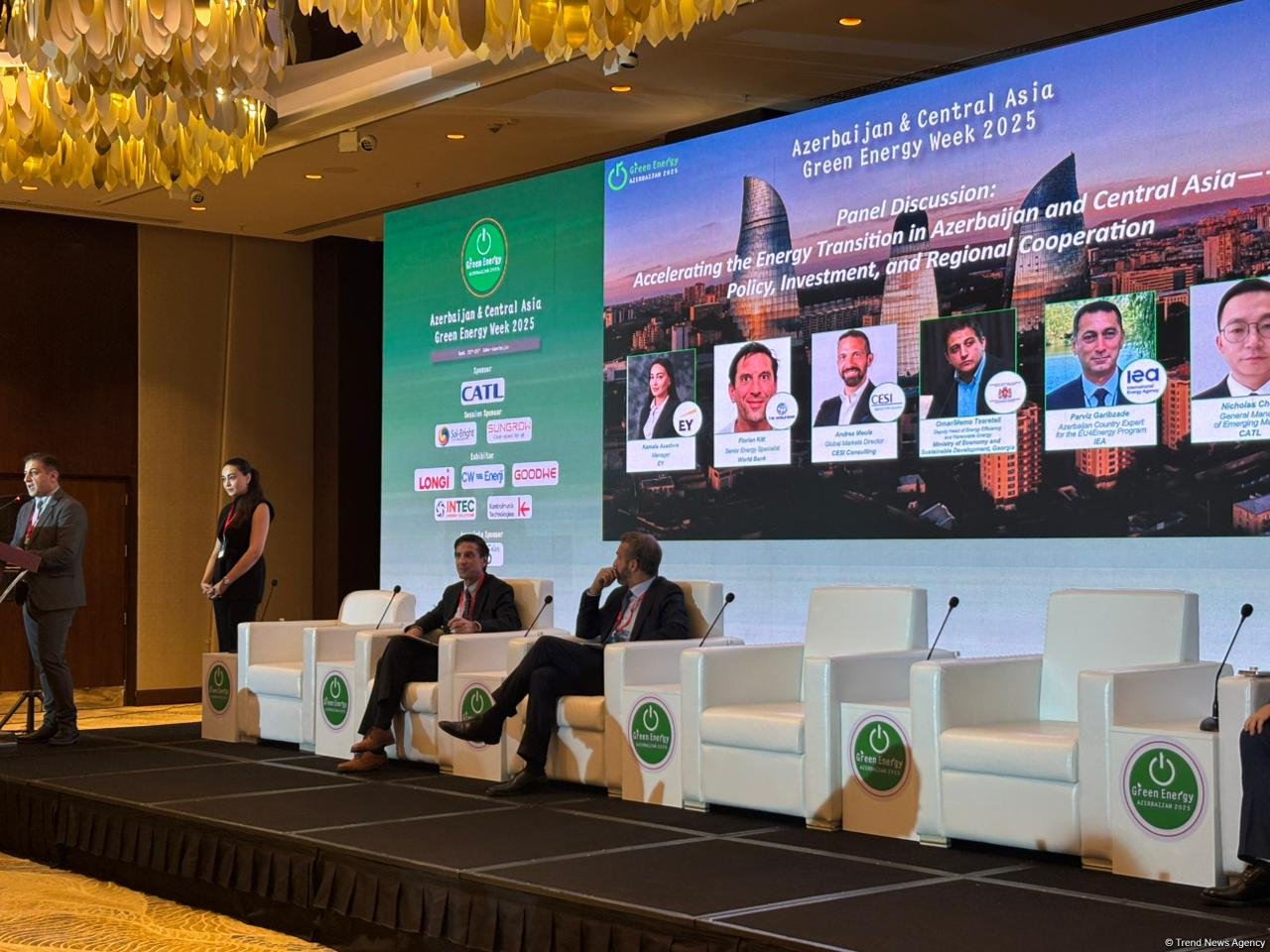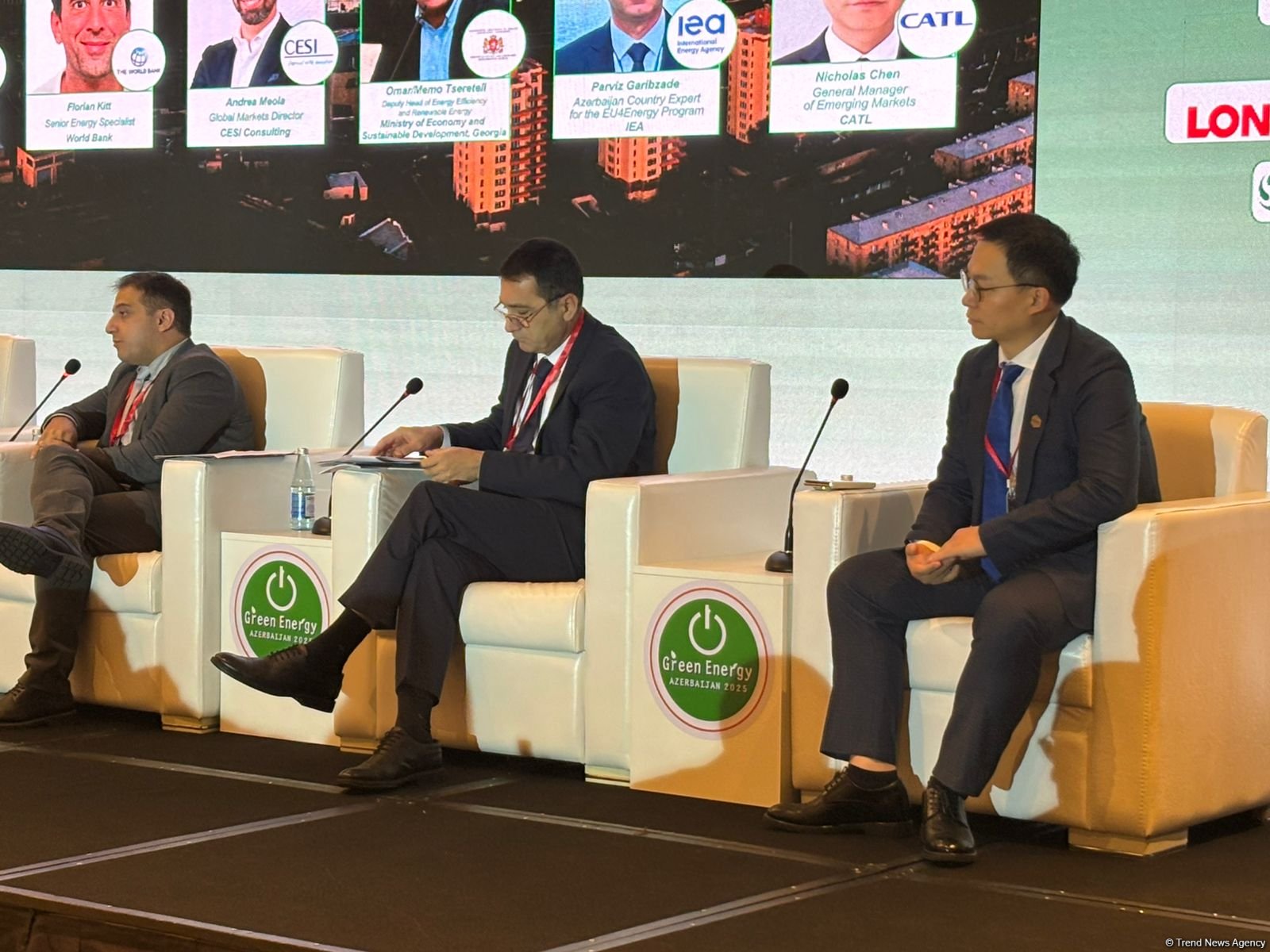BAKU, Azerbaijan, September 25. Azerbaijan & Central Asia Green Energy Week 2025 took place in Baku, Trend reports.
The event featured presentations by Florian Kitt, Senior Energy Specialist at the World Bank Group; Omari Tsereteli, Deputy Head of the Energy Efficiency and Renewable Energy Department at the Ministry of Economy and Sustainable Development of Georgia; Rena Gumbatova, Deputy Director of the Azerbaijan Renewable Energy Agency; Elchin Targuluev, Solar and Wind Energy Specialist at SOCAR Green; and other representatives of energy companies.
The event discussed topics such as accelerating the energy transition in Azerbaijan and Central Asia, including policy, investment, and regional cooperation, as well as Azerbaijan's National Energy Strategy up to 2050 and SOCAR Green's role in developing green energy.
Speaking at the event, Florian Kitt, Senior Energy Specialist at the World Bank, stated that Azerbaijan and countries in the region should more actively coordinate rules for the export of green energy and develop joint investment projects to enter European energy markets.
According to him, the first step is to develop the regionalization of energy markets, particularly in the electricity sector.
"There have already been positive changes in this direction: Georgia is a member of the European Energy Community, and Azerbaijan plans to complete the full separation of functions in the electricity sector by 2028. Today, we are mainly talking about bilateral agreements on electricity exports. But to create a system similar to the single market of the European Union, serious harmonization of rules and regulations will be required," Kitt noted.
He recalled that Azerbaijan already has experience connecting to Turkey's power grid, which is linked to the European market, having fulfilled a number of requirements in this area.
“In addition, joint planning and investment are important. In this context, Azerbaijan, together with Georgia, Romania, and Hungary, has initiated the creation of a special purpose vehicle (SPV) in Romania to develop a ‘green energy port,’” Kitt added.
Omar Tsereteli, Deputy Head of the Energy Efficiency and Renewable Energy Department at the Ministry of Economy and Sustainable Development of Georgia, noted that Azerbaijan's experience in increasing the share of renewable energy sources (RES) is valuable for Georgia.
He also noted that energy and climate plans, low-carbon development strategies, and nationally determined contributions (NDCs) should not remain mere documents on paper:
“We must move towards their practical implementation together. This will be another important step towards deepening cross-border cooperation,” Tsereteli emphasized.
Furthermore, he stated that joint action plans and strategies play a key role in the development of cross-border cooperation in the South Caucasus and Central Asia, particularly in the field of energy and climate initiatives, as well as in the implementation of projects such as the submarine cable across the Black Sea.
According to Tsereteli, strategies, roadmaps, and action plans should not be developed by each country separately, but should be coordinated among themselves:
“Only in this way can we identify priority projects and achieve the goals set by international development organizations. These tasks cannot be accomplished by the efforts of one country alone. Joint work is necessary,” he noted.
Further, speaking at the event, Parviz Garibzade, Azerbaijan expert for the EU Energy Program (EU4Energy) of the International Energy Agency, emphasized that Azerbaijan is moving towards clean energy through consistent market reforms, the abolition of subsidies, and the creation of a competitive environment.
According to Garibzade, since 2016, Azerbaijan has adopted a number of strategies and legislative acts in the energy sector, including laws on heat supply, gas supply, and electricity. The Law on Electricity provides for a three-stage market reform starting in 2025.
“The first step will be the legal and managerial separation of the functions of electricity generation, transmission, distribution, and sale. This is a key measure for the transition to clean energy,” the expert noted, emphasizing the importance of eliminating subsidies in the sector and promoting energy efficiency.
He added that such reforms would help create a transparent and competitive market, which in the long term would ensure Azerbaijan's integration with the energy systems of Georgia and Armenia and access to the European market, as well as enable expanded cooperation with Central Asian countries.
The forum will continue tomorrow.












